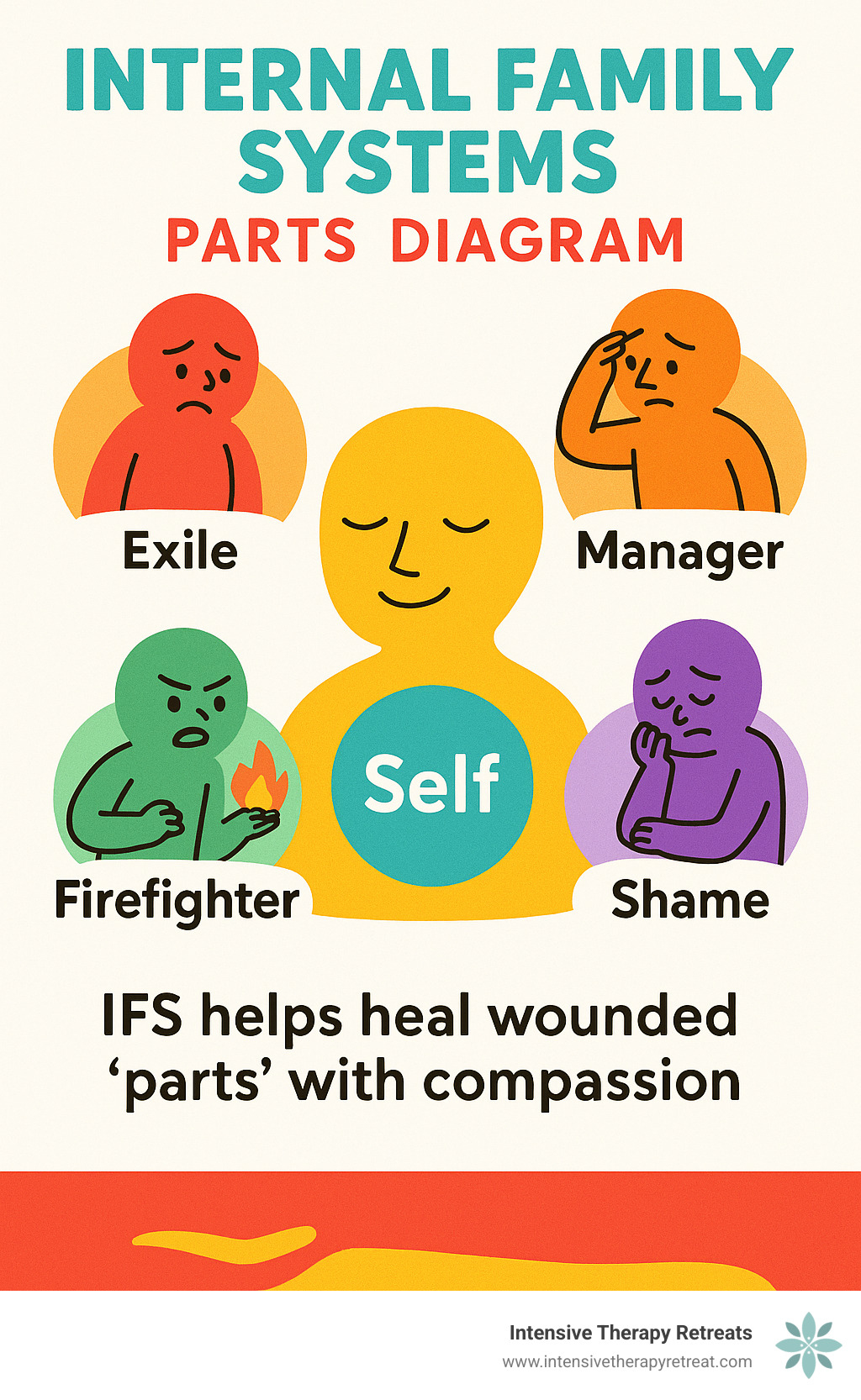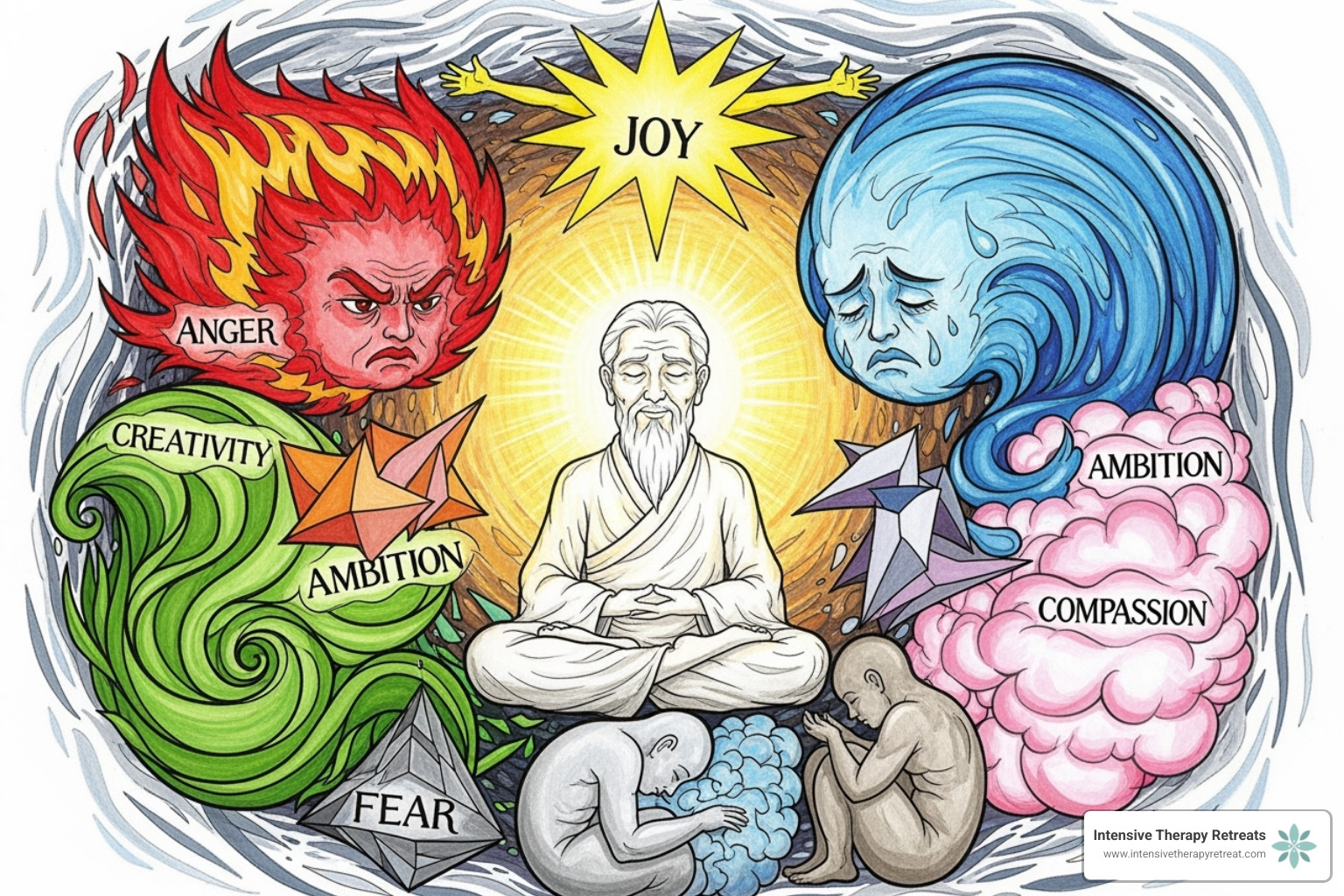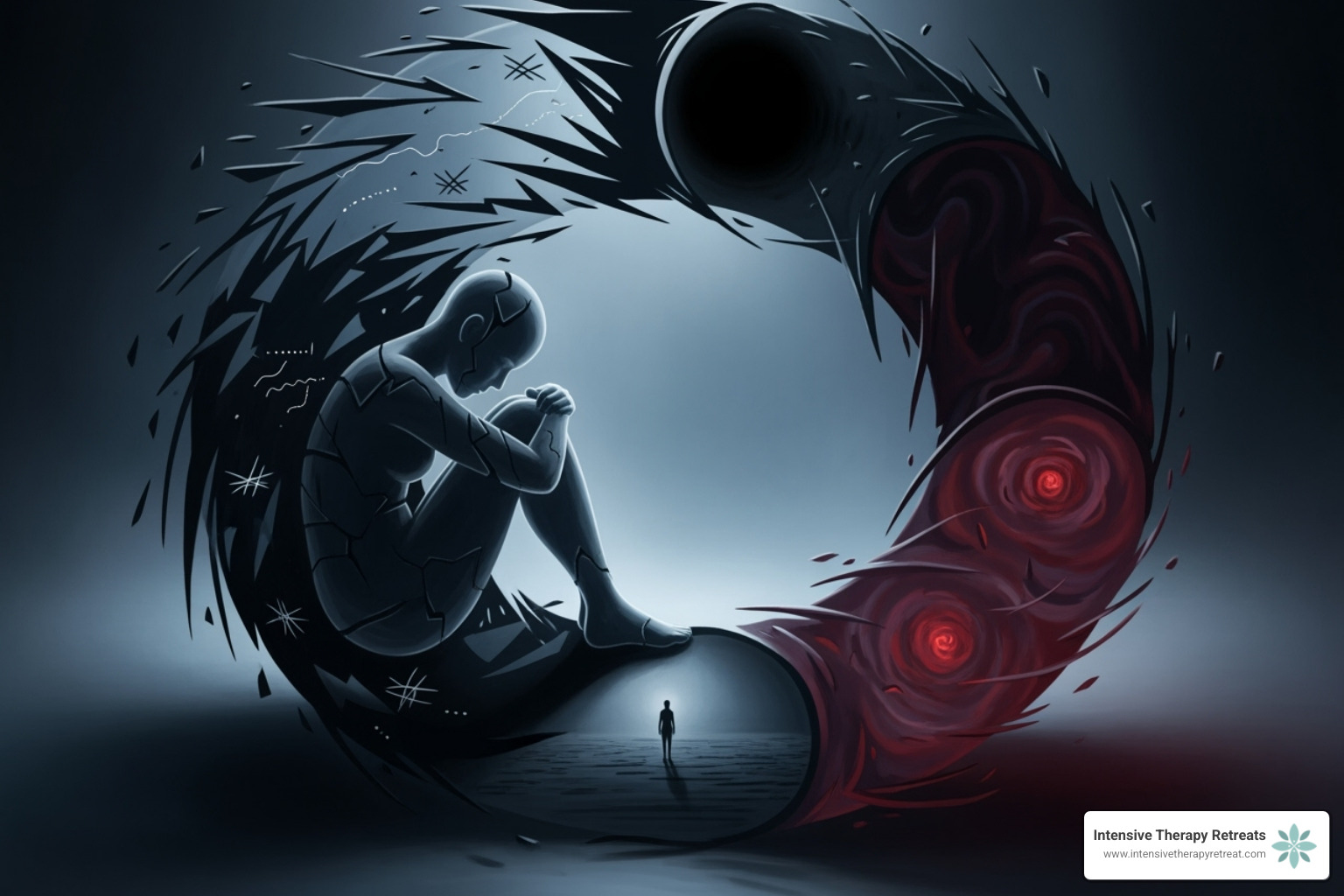Why Internal Family Systems Therapy for Shame and Guilt Offers Hope
Internal family systems therapy for shame and guilt offers a compassionate approach to healing deep wounds. Unlike methods that focus on symptoms, IFS recognizes that shame and guilt are held by specific “parts” of us. Instead of criticizing these parts, we can heal them through understanding.
Quick Answer: How IFS Helps with Shame and Guilt
- Shame = “I am bad” (global self-attack) → IFS helps you separate from this belief
- Guilt = “I did something bad” (behavior-focused) → IFS transforms guilt into healthy repair
- The Method: Work with your internal “parts” through Self-compassion instead of fighting them
- The Goal: Unburden wounded parts and let your wise, calm Self lead the healing
That pit in your stomach and the ruminating thoughts of “I’m a bad person” don’t have to control your life. While most approaches try to suppress painful emotions, IFS takes a different path. It sees shame and guilt not as character flaws, but as protective parts carrying heavy burdens, often from childhood.
The core principle of IFS is that there are no bad parts. Every part of you, even the harshest inner critic, has good intentions and can be healed through compassion.
I’m Dr. Bambi Rattner, and through decades of clinical experience, I’ve witnessed the profound healing that internal family systems therapy for shame and guilt can provide for trauma survivors. Having worked with clients ranging from age 3 to 103 across every therapeutic setting, I’ve found IFS to be uniquely effective at accessing the root causes of shame while offering a compassionate path to lasting freedom.
Similar topics to internal family systems therapy for shame and guilt:
Understanding Shame and Guilt Through the IFS Lens
Have you ever felt caught in a cycle of shame or guilt? These aren’t flaws within you, but rather expressions of inner “parts” trying to protect you. This is the compassionate perspective of Internal Family Systems (IFS) therapy.
At its heart, IFS understands that our minds are made of many different “parts,” each with its own feelings and beliefs. Think of it like an inner family where every member has a role. The good news? Every single part, no matter how extreme, has a positive intention. There are truly “no bad parts.” This compassionate lens is what makes internal family systems therapy for shame and guilt so effective.
How Internal Family Systems Therapy for Shame and Guilt Views Your Inner World
In IFS, our inner world consists of our Self and our parts.
Your Self is your core essence—a source of wisdom, compassion, and calm that is always present and unharmed by life’s difficulties. It is inherently whole and capable of leading your inner system toward healing. The Self is recognized by its eight “C” qualities: Curiosity, Calmness, Clarity, Connectedness, Courage, Compassion, Confidence, and Creativity.
Your parts are the subpersonalities that hold your thoughts, emotions, and memories. They develop from life experiences and take on roles to protect you. IFS categorizes them into three types:
- Exiles: Vulnerable, often young parts that carry the burdens of trauma, pain, and shame. They are exiled because their feelings can feel overwhelming.
- Managers: Proactive protectors that try to control your life to prevent exiles from being triggered. They can manifest as an inner critic, a perfectionist, or a people-pleaser.
- Firefighters: Reactive protectors that jump in to douse emotional fires when an exile’s pain breaks through. Their methods can be extreme, such as addictions, rage, or dissociation, as they desperately try to numb the pain.
Parts carry “burdens”—extreme beliefs like “I am worthless” from difficult experiences. Some are “legacy burdens” passed down through generations. The goal of IFS is to help parts release these burdens, guided by the compassionate leadership of the Self. You can learn More info about IFS Therapy on our site.
Differentiating Shame from Guilt
A crucial distinction in internal family systems therapy for shame and guilt is understanding the difference between these two emotions. IFS helps untangle them, as their paths to healing are distinct.
| Feature | Shame (‘I am bad’) | Guilt (‘I did something bad’) |
|---|---|---|
| Focus | Global self-assessment: “I am bad/flawed/unworthy” | Specific behavior assessment: “I did something wrong” |
| Impact | Self-attack, rage, isolation, hiding, feeling worthless | Concern for others, desire for repair, introspection, remorse |
| Origin (IFS) | Often carried by Exiles, resulting from early trauma, rejection, neglect | Can be a healthy signal from a part aligned with values; can also be burdensome if linked to shame |
| Adaptive? | Generally maladaptive, deeply painful, leads to withdrawal | Can be prosocial and adaptive; motivates amends and learning |
| Outcome | Deep sense of inadequacy, can fuel psychiatric symptoms | Leads to taking responsibility, making amends, forgiveness |
Shame is a painful belief that “I AM BAD,” a global identity that makes us want to hide. Guilt, in contrast, is about behavior: “I DID something bad.” When free from shame, guilt is adaptive and prosocial, motivating us to make amends and repair relationships.
For example, feeling guilt after stepping on someone’s foot leads to an apology. Feeling shame leads to believing, “I’m such a klutz, I’m worthless.”
IFS helps us challenge the global identity of shame while validating healthy guilt, which is essential for taking responsibility and maintaining relationships. To dive deeper into this important distinction, you might find Brené Brown on Shame v. Guilt helpful.
The Shame Cycle: How We Get Trapped and How IFS Frees Us
Shame often leads to a vicious cycle that keeps us trapped. It starts with early experiences where we internalize the belief that we are fundamentally flawed, driving a pattern of thoughts and behaviors that IFS calls the “shame cycle.”
This cycle is painful and isolating, but IFS provides a clear map to interrupt it. By understanding the roles our parts play, we can compassionately intervene and free ourselves from its grip.
The Six Acts of the Shame Cycle
Leading IFS voice Martha Sweezy describes the shame cycle in six “acts”:
- The Shaming Event: The cycle begins with a trigger, often an external event like a harsh reprimand or humiliation that sends the message, “You are not worthy.”
- Acceptance (‘I am bad’): We internalize the event, accepting the belief that “I am bad” or “I am worthless.” This belief is often carried by an exiled part.
- Inner Critics Attack: Manager parts, acting as inner critics, attack us for our perceived flaws, believing this harshness will prevent future pain.
- ‘Never Again’ Managers: Other managers work to prevent future shaming by making us avoidant, overly cautious, or controlling.
- Warrior Mutiny (Firefighters): When shame breaks through, firefighter parts deflect it outward through anger, blame, or projection.
- Feel-Good Rescue Team (Firefighters): Other firefighters try to numb the intense pain with short-term fixes like binge-eating, substance use, or other addictive behaviors.
This cycle is a powerful loop where shaming “backfires spectacularly,” leading to defensive reactions that don’t solve the problem.
The Role of the Self in Healing the Shame Cycle
The IFS model offers a clear exit from this cycle by connecting with our Self and bringing its compassionate qualities to our parts.
- Self-leadership: The Self allows us to “unblend” from the parts stuck in the shame cycle. We can observe our inner critics and reactive firefighters with compassion, recognizing they are trying to help.
- Witnessing pain: By creating space between our Self and our parts, we can approach them with curiosity. The Self can then compassionately witness the pain of the exiled parts without being overwhelmed.
- Reparenting exiles: The Self offers the exiled part what it needed in the past—love, acceptance, and validation. This powerful act of “reparenting” helps the part release its burdens.
- Compassion as an antidote: Self-compassion is the ultimate antidote to shame. It counters self-criticism and fosters kindness toward ourselves, leading to a lasting shift from “I am bad” to “I am worthy, flaws and all.”
Understanding the shame cycle helps us spot what’s happening inside and unblend from parts, allowing us to comfort vulnerable parts before protectors react. This is a core part of what we focus on in our intensive mental health retreats. Learn More info about intensive mental health retreats.
Practical IFS Techniques for Working with Shame and Guilt
Now that we understand the IFS view of our inner world, how do we actually do this work? When you’re wrestling with shame, you don’t have to fight your inner critic or push your feelings away. Instead, you can learn to approach these painful parts with curiosity and kindness.
IFS provides concrete techniques to build genuine relationships with your parts. Think of it as learning to be a compassionate parent to all aspects of yourself, even those carrying heavy burdens of shame and guilt.
The IFS Protocol: A Step-by-Step Guide to Internal Family Systems Therapy for Shame and Guilt
While internal family systems therapy for shame and guilt is best practiced with a trained therapist, understanding the basic steps shows how healing unfolds. IFS therapists often use the “6 F’s” as a roadmap for connecting with parts:
- Find: Notice a part that is activated (e.g., a part feeling shame).
- Focus: Turn your attention inward toward that part.
- Flesh out: Get to know the part’s characteristics, age, and role. This helps you separate from it.
- Feel toward: From your Self, notice how you feel toward the part. If you feel judgment, that’s another part. Ask it to step aside so you can connect with compassion.
- Befriend: Build a trusting relationship with the part. For protectors, ask what they fear would happen if they stopped their job.
- Fears: This step (often combined with Befriending) is about understanding the fears of protective parts.
This process leads to understanding what protectors are guarding: a vulnerable exile. With permission, we can then witness the exile’s story and help it unburden the shame and pain it has carried for so long. This unburdening is a profound release, like setting down a heavy backpack you’ve carried for years.
Alternatives to Shaming Your Parts
Most of us have learned to shame our own parts, but this approach only creates more pain. Internal family systems therapy for shame and guilt offers a radical alternative: meeting your parts with the qualities of your Self.
- Curiosity replaces judgment: Instead of fighting your inner critic, ask, “What are you trying to protect me from?” This simple shift can transform your inner relationship.
- Compassion is the default: The part of you feeling deep shame needs kindness, not more criticism. Approach it with the warmth you’d offer a friend.
- Calm provides a steady presence: Your Self can be a peaceful guide for anxious or activated parts, helping them feel safe enough to share their pain.
The key is asking instead of demanding, inviting parts into a dialogue. This approach recognizes that every part has good intentions, even if its methods are extreme. When parts feel understood, they naturally relax and find healthier roles, creating the conditions for lasting healing.
This compassionate approach to working with parts is something we focus on extensively in our retreats, often combining IFS with other proven methods like Accelerated Resolution Therapy to help people experience profound shifts in just days rather than years.
The Unique Benefits of Internal Family Systems Therapy for Shame and Guilt
Why is internal family systems therapy for shame and guilt such a powerful path to well-being? It’s about more than just addressing symptoms; it gets to the root of your distress. This approach helps you build self-esteem, grow your emotional resilience, and foster improved relationships. For those healing from trauma, IFS helps you understand and mend wounded parts from childhood, leading to profound, lasting change.
A Compassionate Alternative to Self-Criticism
Many therapies can unintentionally reinforce the idea that we are flawed. Internal family systems therapy for shame and guilt offers a liberating alternative based on one truth: there are no bad parts of you, only parts carrying heavy burdens.
Instead of battling your inner critic, IFS invites you to approach it with curiosity and compassion. You learn to see this part as a protector trying to keep you safe, which helps end the inner war and frees up immense energy. You don’t silence the critic; you transform it by understanding its good intentions and helping it find a healthier role. This process forges reconciliation among your inner parts and cultivates profound self-compassion, allowing you to treat yourself with kindness.
Healing the Root of Shame, Not Just the Symptoms
While many therapies manage symptoms, internal family systems therapy for shame and guilt heals the origin of the pain. It goes to the root of shame, which is often found in earlier wounds.
This healing involves addressing childhood wounds by accessing and healing the young, exiled parts that hold the pain of past abuse, neglect, or rejection. The process of unburdening trauma is transformative; it’s an active experience where parts release the intense emotions and limiting beliefs (like “I’m not good enough”) they’ve carried for years. IFS also addresses intergenerational trauma, helping you release “legacy burdens” passed down through your family. This deep, compassionate work helps form new neural pathways, creating lasting shifts in how you experience yourself and the world. This kind of profound healing can often be amplified in programs that include complementary approaches like EMDR therapy.
As a clinical case study on regulating shame with IFS clearly shows, learning to manage shame and experience healthy guilt is incredibly important, especially for those healing from trauma. The IFS approach, with its focus on understanding your inner system and tapping into your inherent compassion, truly proves to be a powerful way to treat these complex issues. You can dive deeper into this by reading the Clinical case study on regulating shame with IFS.
Frequently Asked Questions about IFS for Shame and Guilt
We understand that internal family systems therapy for shame and guilt might introduce some fresh ideas. It’s natural to have questions! Here, we’ll dive into some of the most common inquiries we hear about this transformative approach.
How is IFS different from just talking to my inner critic?
It’s a profound shift in your relationship with that part. Instead of arguing with or suppressing your inner critic, IFS helps you:
- Understand its protective role: The critic (a Manager part) isn’t trying to hurt you; it’s trying to protect you from the deeper pain of a shamed, exiled part. It believes being harsh will prevent future mistakes and rejection.
- Unblend from it: You learn to step back and observe the critic from your compassionate, curious Self, rather than being consumed by its voice.
- Lead with compassion: From your Self, you can listen to the critic’s fears and acknowledge its hard work, which helps it relax.
- Heal the underlying exile: The ultimate goal is to heal the vulnerable part the critic is protecting. Once that exile’s pain is unburdened, the critic no longer needs to be so harsh and can adopt a healthier, more supportive role.
Can I do IFS on my own to heal shame and guilt?
While practicing self-compassion and noticing your parts on your own is beneficial for self-awareness, working with a trained IFS therapist is highly recommended for healing deep-seated shame, especially if it’s linked to trauma. A therapist provides:
- Safety and guidance: A therapist helps you steer intense emotions safely, preventing you from becoming overwhelmed or re-traumatized.
- Clarity: It can be difficult to distinguish parts from your Self. A therapist helps you access your Self and steer complex internal conflicts between parts.
- Effective unburdening: The process of helping an exile release its burdens is delicate. A therapist is trained to facilitate this step effectively and avoid common pitfalls.
For profound and lasting healing, the support and expertise of a qualified IFS therapist are invaluable.
How long does it take to see results with IFS for these issues?
The healing journey is unique to each person, so there’s no single timeline. However, many people report feeling initial relief and greater self-awareness within a few sessions. Simply understanding that your struggles come from “parts” with good intentions—rather than a personal flaw—can be incredibly validating.
Deeper healing of long-standing patterns or trauma-related shame takes more time and consistent work. This involves building trust with protective parts and gently unburdening exiles.
Consistency is key, but the focus is on the process, not just the outcome. IFS is not a quick fix but a profound and lasting journey of changing your relationship with yourself, leading to greater inner harmony and freedom from the burdens of shame and guilt.
Conclusion: Embracing Your Whole Self with Compassion
We’ve explored how internal family systems therapy for shame and guilt offers a revolutionary, kind approach to healing. Instead of viewing inner struggles as flaws, IFS sees them as the efforts of protective “parts” trying to keep us safe.
This path guides us to differentiate shame (“I am bad”) from guilt (“I did something bad”), changing self-judgment into self-compassion. By connecting with our core Self—a source of wisdom and calm—we can interrupt the shame cycle, witness our parts’ pain, and help them unburden their heavy loads. The practical techniques of IFS provide a clear framework for healing by choosing curiosity and connection over criticism. This is where the real hope for healing begins.
The benefits of embracing this approach are truly transformative, offering a path to lasting change and well-being:
- You’ll experience boosted self-esteem as you unburden shame and allow your inherent worth to shine through.
- You’ll develop improved emotional resilience, learning to steer difficult feelings with greater calm and confidence.
- Your relationships will improve naturally, as healing your internal dynamics often leads to more authentic and open connections with others.
- You’ll find freedom from past trauma, as IFS addresses the root causes of shame, offering profound release from the burdens of past experiences, including intergenerational patterns.
- This leads to lasting change – not just a temporary fix, but a fundamental shift in your relationship with yourself, fostering inner harmony and genuine self-leadership.
At Intensive Therapy Retreats, we deeply believe in the power of this compassionate model. Our unique approach allows for deep, transformative healing in an accelerated timeframe, helping you move from a place of distress to one of inner peace and freedom. If you’re ready to say goodbye to the heavy burdens of shame and guilt and accept your whole, authentic Self, knowing that all parts are welcome on this journey, we invite you to explore the possibilities.




